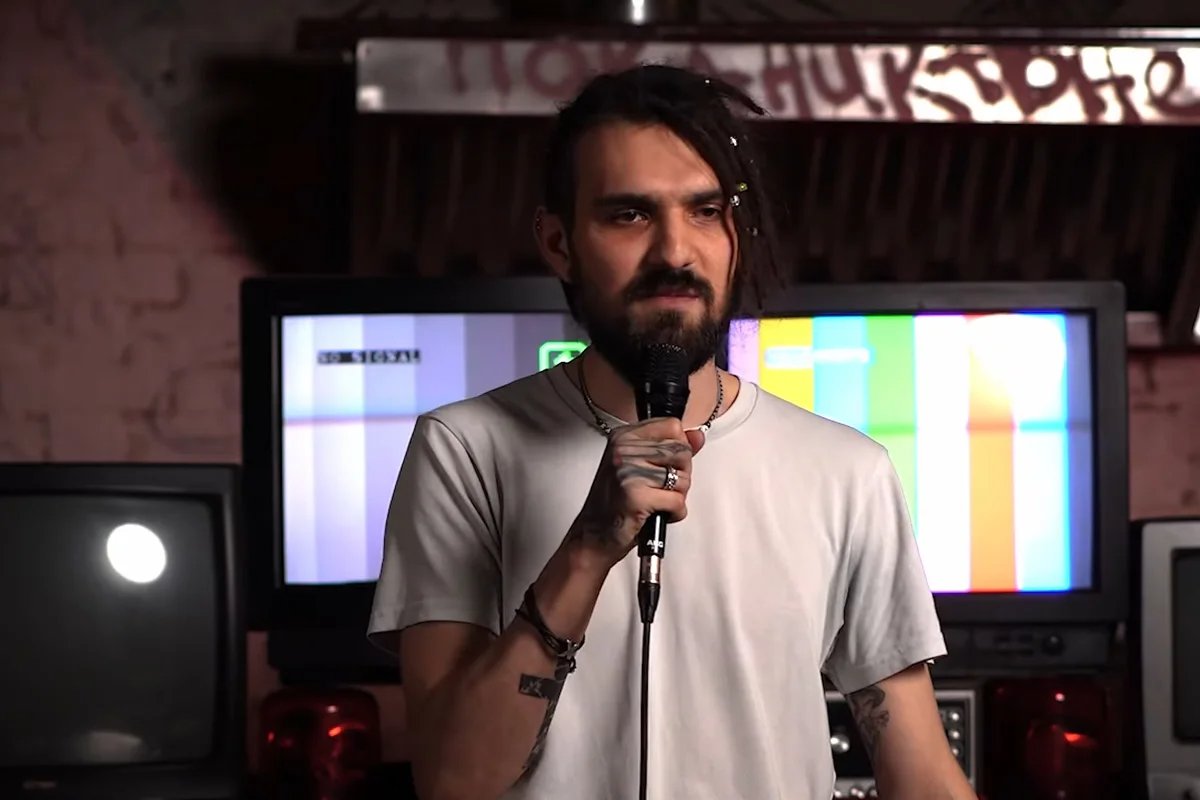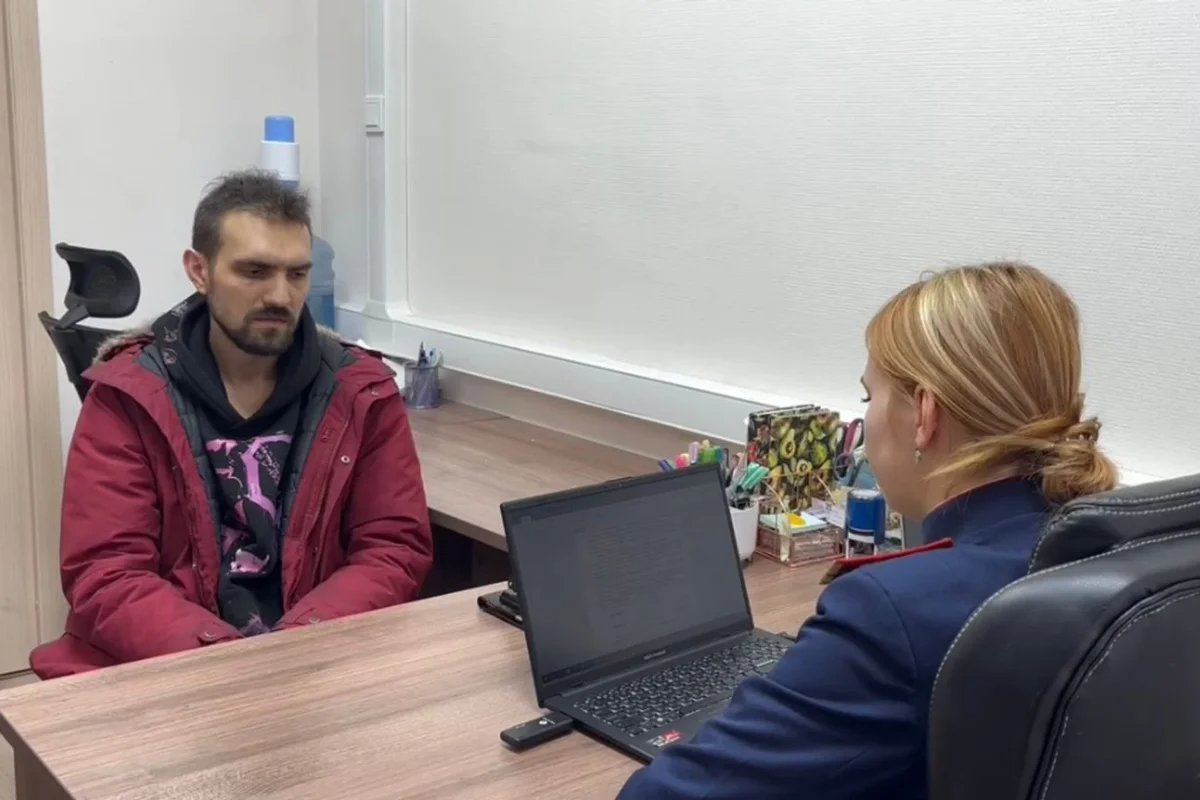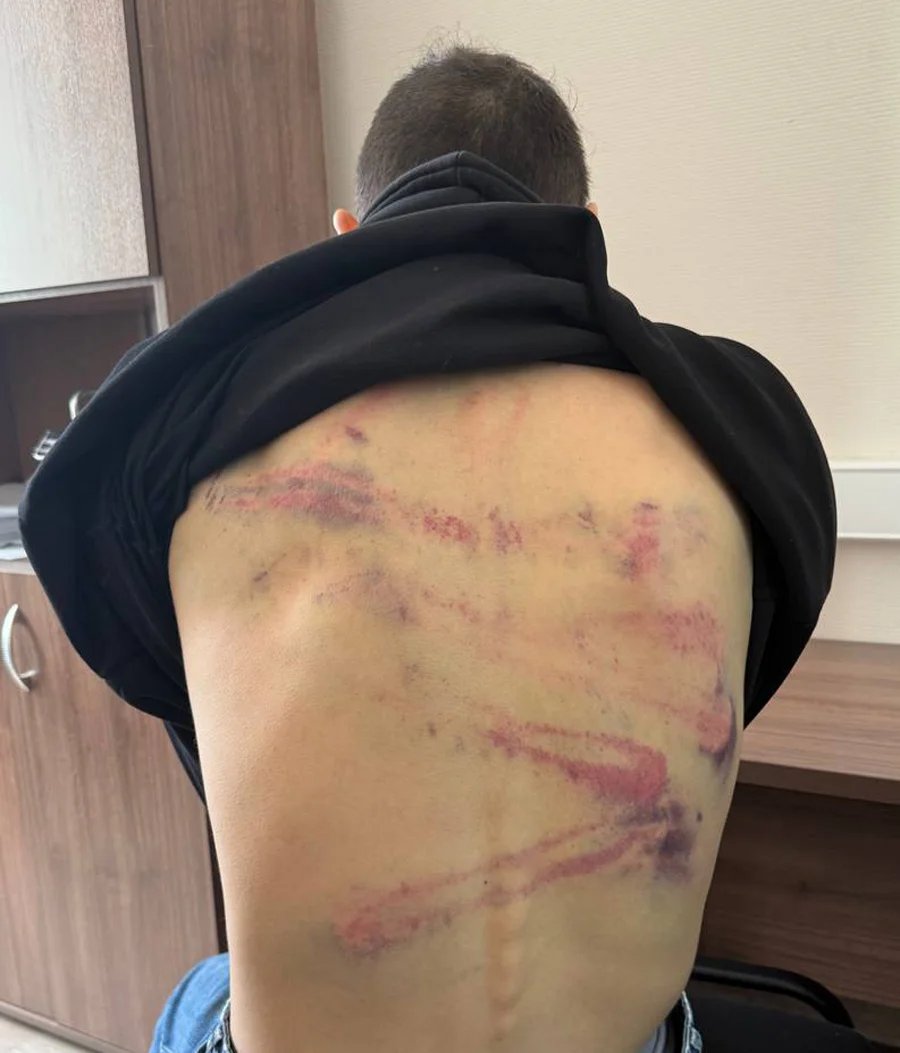A one-minute stand-up set has left a relatively unknown Russian comedian beaten, tortured and facing criminal charges after a social media witch hunt against him led by pro-war bloggers.
Artemy Ostanin was detained in Belarus earlier this month as he attempted to flee Russia via its close ally. Having been beaten and humiliated by Belarusian policemen, Ostanin was handed back to the Russian authorities and he is now in pretrial detention in Moscow with a spinal fracture and a damaged lung — all for a 60-second joke posted to a YouTube channel.
Ostanin’s comedy routine, which has since been deleted, was posted in late February as an episode of 60-Second Stand-Up, a Russian YouTube channel that invites randomly selected stand-up comedians to submit a one-minute performance. On this occasion, it was the blue bearded, dreadlocks sporting Ostanin, a little-known stand-up from the port of Yeysk in Russia’s southern Krasnodar region, whose name was chosen by lot.
For his mini-set, Ostanin chose to tell a story about bumping into a man on the Moscow metro who had lost his legs and moved around on a skateboard. The routine went down like a lead balloon — there was the odd polite laugh from the audience during the slot as a whole, while literally one person laughed at the punchline. The episode got 40,000 views — standard for this show.
That might have been the end to Ostanin’s brush with fame, had the video not come to the attention of pro-war blogger Alexey Zhivov, who in mid-March informed his Telegram channel’s 100,000 members that a stand-up comedian in Moscow had “joked gleefully about disabled veterans of the ‘special military operation’” — referring to Russia’s ongoing invasion of Ukraine.

Artemy Ostanin. Photo: YouTube
Why he concluded the joke referred to a Ukraine war veteran is unclear. Zhivov urged readers to go to Ostanin’s next performance, due the following day, and “ask him questions”, but organisers promptly cancelled the event after receiving threats from pro-war bloggers.
Ostanin’s joke then reached Zov Naroda, an ultranationalist movement best known for denouncing public figures it sees as being ideologically “unsound” to the authorities. It swiftly contacted Alexander Bastrykin, the head of Russia’s Investigative Committee, to demand a “legal appraisal” of the incident. By 15 March, as the video was picked up by other pro-war bloggers, the Investigative Committee opened a criminal case against Ostanin for “inciting hatred”, for which, if found guilty, he could face up to six years in prison.
That same evening, Ostanin told Telegram news channel Ostorozhno Novosti that his joke had nothing to do with the war in Ukraine, and concerned “a beggar on the metro who has been skating around without legs for 20 years”.
Nina*, who attended Ostanin’s performance, told Novaya Europe that while she agreed that the joke was “stupid”, neither she nor her friends thought it was about the war in Ukraine. Besides, if the team running the channel had thought Ostanin was mocking war veterans, they wouldn’t have posted the video, she added, as the Russian stand-up community has been particularly careful about provoking the authorities in recent years amid the Kremlin’s ramping up of wartime censorship.

Ostanin after his arrest, 18 March 2025. Photo: Russian Investigative Committee
“The pro-war crowd will be amazed to hear it, but there were people with disabilities in the country before the ‘special military operation’”, Viktor*, an organiser of stand-up events in Moscow, told Novaya Europe. “If I make a joke about them, will they now automatically decide the joke was about veterans?”
Members of Zov Naroda wouldn’t hear any such explanations, however, saying that the language used created an association with combatants, “whether in Ukraine, Afghanistan or Chechnya”. Even without a military reference, the movement said such words were offensive to people with disabilities.
Conservative campaigner Yekaterina Mizulina, the head of the Safe Internet League, a Kremlin-adjacent body instrumental in directing Russia’s censorship apparatus, soon entered the fray, calling the following day for Ostantin’s prosecution. While Mizulina admitted that she hadn’t detected the subtext that had so angered the pro-war crowd, she noted that Ostanin’s other routines, posted to his own YouTube channel, were guilty of discredited the army.
“2025 has been declared the year of the defender of the fatherland, so we give meat grinders to mothers who have lost their sons… Makes sense. Who knew we lived in a country where politicians have a sense of humour,” Ostanin jokes in his most recent video, referring to an incident in which local politicians representing the ruling United Russia party in the Russian Arctic presented mothers of dead soldiers with meat grinders to celebrate International Women’s Day, understandably causing an outcry.

Ostanin in court, 19 March 2025. Photo: Moscow Courts/Telegram
Ostanin tried to leave Russia via Belarus on 17 March, thinking it was his only option, according to a friend of his who spoke to Novaya Gazeta Europe, but he was detained in Minsk by officers of the Interior Ministry’s Directorate for Combating Organised Crime and Corruption, nicknamed the Belarusian Gestapo, that same day.
Telegram channels associated with the Belarusian police posted photos of Ostanin the following day standing near the Russian-Belarusian border checkpoint with his dreadlocks cut and wearing a meat grinder around his neck, in an apparent reference to his earlier routine.
Once Ostanin was in police custody, the Moscow Investigative Committee posted footage of him apologising on camera for his act: “I had no intention of insulting anyone, hurting anyone’s feelings, making threats or even calling for hostility towards any social group,” he told the investigator.

Bruises on Ostanin’s back. Photo: Eva Merkacheva /Telegram
The first court hearing was held in Moscow on 19 March, where Ostanin’s lawyer Veronika Polyakova said that he had suffered broken ribs and a fractured spine at the hands of the Belarusian police, but despite his poor health, the court placed him under arrest for nearly two months.
On 20 March, Eva Merkacheva of Russia’s Presidential Council for Human Rights reported that the Belarusian security forces took Ostanin into a forest and severely beat him and tasered him before handing him over to their Russian counterparts. Merkacheva posted a photo of Ostanin’s back, showing the aftermath of being beaten with a truncheon.
A medical examination requested by Ostanin in police custody recorded a vertebral fracture, multiple bruises and abrasions and breathing difficulties due to an injured lung.
Meanwhile, Belarusian Deputy Interior Minister Henadz Kazakevich denied that Ostanin was beaten in Belarusian custody, noting that “no physical force or other unlawful methods” were used during his detention, delivery or transfer.
Ostanin is currently in a pretrial detention centre in Moscow, where he is not receiving medical care, according to his lawyer.
“I’m sure that he’ll make a great soldier after he’s sentenced,” Zhivov, one of the bloggers who launched the vigilante social media campaign against Ostanin, quipped after his arrest, even though Ostanin’s charge — “inciting hatred”, even in jest — is not, unlike rape and murder, one of the crimes that Russians can be pardoned for in return for enlisting to fight in Ukraine.
*Not their real names
Join us in rebuilding Novaya Gazeta Europe
The Russian government has banned independent media. We were forced to leave our country in order to keep doing our job, telling our readers about what is going on Russia, Ukraine and Europe.
We will continue fighting against warfare and dictatorship. We believe that freedom of speech is the most efficient antidote against tyranny. Support us financially to help us fight for peace and freedom.
By clicking the Support button, you agree to the processing of your personal data.
To cancel a regular donation, please write to [email protected]

